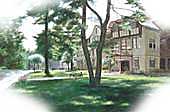Fall
1981
Hannah’s Song
Kathy Clement
Pinecrest Graduate
“Now there was a certain man of Ramah . . . and his
name was Elkanah . . . and he had two wives; the name of the
one was Hannah, and the name of the other was Peninnah: and
Peninnah had children, but Hannah had no children . . . the
Lord had shut up her womb.” I Samuel 1:1, 2, 5
In ancient times, to be barren was a terrible disgrace. A
person who could not bring forth a child was thought to be
under divine punishment. Every Hebrew woman carried the hope
in her heart that she might be the mother of the Messiah,
so among the Israelites it was a double disgrace to be childless.
In Israel, there was a man named Elkanah who feared and served
the Lord along with his household. He had two wives: Peninnah,
who bore him children, and Hannah who, though greatly loved,
was barren.
Each year, Elkanah’s family would go to Shiloh to worship
and sacrifice to the Lord. Each year, he distributed to his
wives their portion of the offering. Each year, Hannah watched
as one by one Peninnah’s children received their portions,
knowing that once again she would receive only for herself.
Even though Elkanah gave her a double portion, it could not
make up for the pain and shame that she bore in her barrenness.
To make matters worse, Peninnah continually chided her and
scoffed at her low estate from the time they left Ramah until
the time they returned. Hannah was so provoked that she could
do nothing but weep, and refused to eat. Even loving Elkanah
could not understand her sorrow and gently rebuked her, “Hannah,
why weepest thou? And why eatest thou not? And why is thy
heart grieved? Am not I better to thee than ten sons?”
So it went, year after barren year, for the Lord had shut
up her womb. Now, why would the Lord shut up her womb? She
went yearly to offer sacrifice and worship with her husband.
We know she was a good wife to Elkanah for the Scriptures
say that he greatly loved her. It would seem that everything
in her life was in order, yet God shut her womb. The Lord
made her barren, not because He was displeased with her, but
because He desired to bring her into a depth of relationship
with Himself. He wanted Hannah to see her own insufficiency,
and He wanted to reveal Himself to her as the rock of her
salvation.
The Lord used Hannah’s circumstances to drive her ever
deeper into Himself. The barrenness, the yearly agony of making
this trip to Shiloh, the inability of her beloved husband
to understand her misery, even the taunting from Peninnah
were all being used by God to produce a fruitfulness in Hannah’s
spirit so that she could ultimately bring forth fruit in her
life.
God employs this same method in our lives. Many times we
experience periods of barrenness where it seems as though
God has forsaken us in displeasure. Our close friends misunderstand
our position, and it seems as though everyone but us is bearing
fruit. The enemy will provoke us and taunt us; drive us to
tears as year after year our spiritual arms are empty. He
loves to make us fret; he loves to point out that God is moving
upon those around us to preach, to prophesy, to teach, to
minister while we have nothing to show for our years of worshipping
and sacrificing. It seems at times that Satan’s nagging
will never cease and we are driven to the point of desperation;
driven right into the arms of the Lord.
This is what happened to Hannah. After everyone had eaten
and was full, the gnawing emptiness within her drove her to
the Lord. She was “in bitterness of soul, and prayed
to the Lord and wept sore.” This does not mean that
Hannah went in a bitter spirit before the Lord. The Hebrew
word for bitterness here actually means “heavy, great,
anguished, chafed, sorrowful, discontented.” Her heart
was about to break as she went before the Lord. The burden
was too great for her to bear alone. Do you know the feeling?
The agony of spirit, the aching to see your heart’s
desire heard and answered? This is how Hannah came before
God—not bitter, but groaning within for God to look
down upon her, to hear her petition.
“And she vowed a vow, and said, O Lord of hosts, if
thou wilt indeed look upon the affliction of thine handmaid,
and remember me, and not forget thine handmaid, but will give
unto thine handmaid a man child, then I will give him unto
the Lord all the days of his life, and there shall no razor
come upon his head. And it shall come to pass as she continued
praying before the Lord, that Eli marked her mouth.”
Not only did Hannah pray, she continued to pray. This word
in the Hebrew is a word with great meaning: “to increase,
to enlarge, to heap up, to be long, to give the more, to multiply,
to be thorough.” Many times we pray and give up too
soon. We need to learn to pray through an issue; to continue
in prayer. It says that Hannah “poured out her soul.”
She held nothing back from the Lord. She reverently laid the
entire issue at His feet, and praise God, He heard her petitions.
After Eli’s blessing on her, she “went on her
way and her countenance was no more sad.” She had given
the matter to the Lord, but more importantly, she had met
with the Lord in a way that changed her life. She came into
a more intimate relationship with God.
When Hannah returned home, the Scripture says, “God
remembered her.” Many times it would seem that the Lord
has forgotten us, and will forever leave us barren. But just
as surely as He remembered Hannah and caused her to conceive
Samuel, He will remember us and cause the seed of His life
within us to begin to grow. Hannah sought the Lord during
the time of barrenness and not only brought forth a son, she
brought forth God’s mighty prophet Samuel. By the same
token, as we seek the Lord during the barren times, that which
will come forth in our lives will be prophetic in nature.
It will speak of the very nature and character of the Lord,
and will always be given back to the Lord in consecration
for His service; never kept for our own selfish use.
God is very busy in our lives during the barren times. He
is enlarging our capacity for Himself. He is stretching us
to prepare us for a great increase in the spirit. Do not despair
at seemingly unfruitful periods in your life, for God is doing
a precious, hidden work of preparation in you that will result
in you bearing a son; the image of the Lord Jesus Christ in
your life. He will raise the poor in spirit out of the dust;
He will cause you to inherit the throne of glory, but first
are the barren times: the times when we are “poured
out” that we might contain that much more of His Spirit.
God knows what He is doing in your life. Each hardship is
creating within you a greater capacity to know Him. From your
emptiness, you will “break forth on the right hand and
on the left.” Your sorrow and weeping will be transformed
into a song of rejoicing as you see the likeness of Christ
pour forth from your life. Though it seems that your barrenness
will never be turned into fruitfulness continue in worship,
continue in sacrifice, continue in prayer: for in due time
you will sing with Hannah, “My heart rejoiceth in the
Lord, mine horn is exalted in the Lord; my mouth is enlarged
over mine enemies; because I rejoice in thy salvation.”


